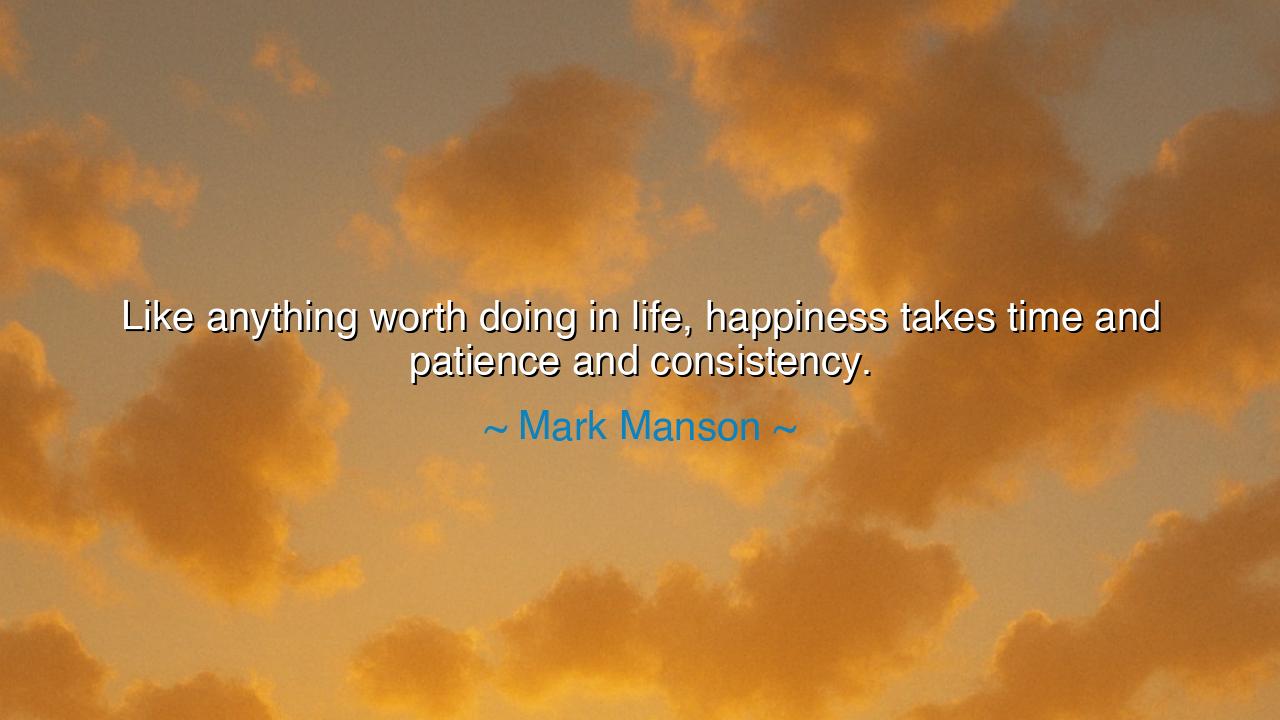
Like anything worth doing in life, happiness takes time and






“Like anything worth doing in life, happiness takes time and patience and consistency.” – Mark Manson
In this grounded and luminous truth, Mark Manson, the modern philosopher of emotional honesty, reminds us that happiness is not a prize to be won but a craft to be cultivated. His words echo the timeless wisdom of the ancients — that nothing of true value comes swiftly or without effort. The human heart, restless and yearning, often seeks happiness as though it were a destination — a mountain peak that, once reached, would bring eternal peace. Yet Manson teaches that happiness, like any worthy endeavor, demands time, patience, and above all, consistency. It is not found in grand moments of triumph, but in the quiet discipline of living well each day, of tending to the soul as one would a garden.
The origin of this insight lies not in philosophy alone, but in the realities of human experience. Manson, whose work often explores the illusions of modern life, has seen how many chase happiness through pleasure, distraction, or achievement, only to find themselves emptier than before. He understands that happiness is a practice, not a purchase. It is like learning an instrument or mastering a craft — it grows through effort, stumbles, and persistence. Those who seek it through shortcuts or bursts of indulgence will find only fleeting satisfaction, for true happiness blooms slowly, nourished by patience and nurtured by routine.
The ancients knew this as well. Aristotle, the philosopher of virtue, spoke of eudaimonia — not happiness as mere pleasure, but the flourishing of the soul through right action over time. He said that a man cannot be called happy because of a single good day or a single joy, just as one swallow does not make a spring. Happiness, he taught, is the result of habit, of living with excellence day by day, even when it is difficult. Manson’s wisdom, though written for a modern world, flows from the same ancient river: that happiness must be earned not through external success, but through the consistent cultivation of the inner life.
Consider the story of Nelson Mandela, who spent twenty-seven years in prison, deprived of freedom, comfort, and companionship. Yet from that darkness, he emerged not bitter but luminous — a man of peace, patience, and inner joy. How could such happiness exist in the face of so much suffering? It was because Mandela understood what Manson now teaches: that happiness takes time, that it is forged in endurance, not in escape. Each day in his cell, he practiced forgiveness, reflection, and hope. He built happiness not as a fleeting feeling, but as a fortress of the spirit — one brick of courage at a time.
In this way, patience becomes the mother of joy. For the heart that rushes cannot grow roots, and the mind that demands instant pleasure cannot know peace. True happiness asks us to walk slowly, to stay the course when life feels dull or uncertain. It asks us to trust the process, to keep doing the small good things — to care, to learn, to love, to be grateful — even when they seem to bear no fruit. Like a seed buried in the earth, happiness requires darkness before it can bloom. It is consistency that turns hope into harvest.
So too must we remember that happiness is not perfection. It is the quiet strength to live through imperfection — to rise after failure, to forgive after pain, to begin again after loss. Each act of consistency — waking with gratitude, showing kindness, practicing self-discipline — builds a foundation upon which lasting happiness stands. The wise know that joy is not found in intensity, but in continuity; not in the sparks of excitement, but in the steady flame of purpose.
Therefore, my children, take this teaching into your hearts: do not chase happiness as though it were prey, but build it as though it were a temple. Give it your time, your patience, your consistency. Tend to your thoughts as you would to a garden — pull out weeds of resentment, water the soil with gratitude, let the sun of discipline shine upon it. Do not despair if joy does not come at once; every great thing in life takes time to mature. Trust that every small effort — every act of love, every moment of courage, every breath of patience — is part of the sacred labor that makes happiness possible.
For in the end, as Mark Manson teaches, happiness is not something you find — it is something you grow. And those who persist in this quiet, patient work will one day awaken to discover that happiness has been with them all along — not as a fleeting visitor, but as a faithful companion of the soul.






AAdministratorAdministrator
Welcome, honored guests. Please leave a comment, we will respond soon